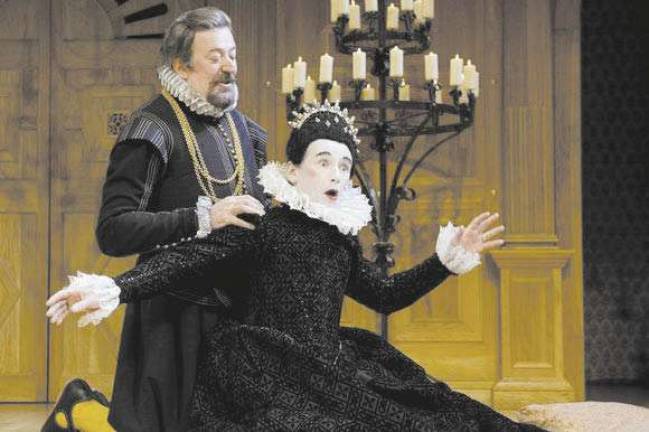Back to the Basics of the Bard

Rylance re-invents Shakespeareat the Belasco
It is fitting that the Globe Shakespeare company's new repertory event appear at New York City's most dramatically beautiful venue, The Belasco Theater. Its recently renovated, sumptuous, layered designed---both theater and sanctuary, offering volume, ornamentation and radiance--makes an on-stage performance special. Imagination and skill are represented in a jewel box--as a gift.
Specifically, the Globe Shakespeare's company's gift is a reminder of how Shakespeare works; this season: Twelfe Night and Richard III done right. The troupe is dedicated to performing Shakespeare's plays according to original tradition--using authentic materials for costumes, replicating the stage-with-gallery space, the audience hubbub with on-stage audience as if still encircled at the Old Globe and a cast of male actors who take on the female roles.
The gift is not tradition done for its own sake but a revelation of what is intrinsically visionary and moving about Twelfe Night and Richard III. Director Tim Carroll and lead actor Mark Rylance (the Globe Shakespeare's original Artistic Director) are innovative purists. Instead of paring-down the Bard, they emphasize his essentials: Language that articulates the cunning of both the writer and his characters and acting that restores the lively essence and purpose of theater.
By alternating two plays in opposite genres, Carroll and Rylance show off their versatility as well as Shakespeare's. Carroll and Rylance trust in the material while leaping, inventively and with principle into the joy of theater. Their pageants vivify the lessons of Richard III's twisted machinations to attain power and revenge against universe and in Twelfe Night, the egotistical trickery that humans inflict upon themselves and each other in pursuing the varieties of Love.
There is evident love of theater in the exacting execution of Elizabethan tradition: The men on stage don't camp it up, but achieve the emotional essence of female experience and the visual essence of feminine appearance (in white facial make-up that re-presents the idea of "fair"). Samuel Barnett, Liam Brennan and Paul Chahidi and Kurt Egyiawan are especially notable at this. They are in sync with Rylance's ingenuity, his deep, risky, sometimes perversely amusing engagement with Shakespeare's psychological possibilities. As Olivia in Twelfe Night, Rylance moves with geisha-like speed and daintiness yet not so artificial as spoof but as tribute. In Richard III he takes the physical zing of political monstrousness to personal extremes: a loutish rascal capable of offending all the senses.
Its clear that Rylance and Carroll follow a shared concept of the plays' contemporary relevance: The comedy blatantly toys with sexual identity as much as with the solipsism we think of as modern. The tragedy diminishes bloodline nobility (the sanctity of celebrity) in accordance with our own political skepticism--and still keeps us morally aghast. Carroll and Rylance dare reminds us why Shakespeare always works. In both plays, the Globe Shakespeare's approach goes back to the basics; it is appropriately modest and momentous.
Follow Armond White on Twitter at 3xchair[]